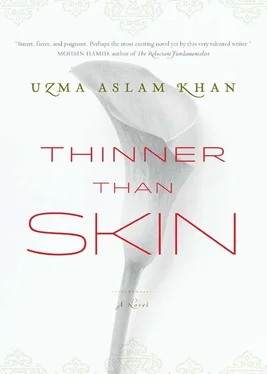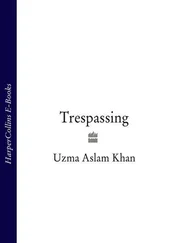“Thanks for the lesson.” He ruffled her hair. “How many glaciers have I studied?”
“Sorry.”
“How far are we from Gilgit?” He asked Irfan.
“Not far,” said Irfan, pulling him away.
Farhana and I were left alone. I lowered my camera.
Behind us, a row of military trucks raced up the highway, slowing to examine our group. I heard them call out to Irfan and watched as they waved their guns in the air as casually as cigarettes. I let Irfan tackle them.
Across the valley, a farmer was nurturing his field with water he’d probably helped create. The sun was creeping off the glacier’s lip and onto the dark gravel. He stopped to enjoy the light, just as we did. A goat grazed at his feet, bells chiming. I pushed thoughts of Kiran’s goat and bells far into the chasm ahead. In its place surfaced an image of us from last year. We were standing on guard, gazing out at the Pacific Ocean, where gunships once pointed to the minefields outside Golden Gate. Take me back , she’d said. Take me back to the places you love .
Gradually, the black earth immediately before us ignited, as if the sun had chosen that precise point upon which to rest its fiery fingers, swallowing the man and the goat. We kept at our lookouts, squinting into the glare, waiting for the sun to release the captives. From the corner of my eye, I noticed a rolling, as of a raincloud. As the glacier slid into shadow, we could still hear the bells of Kiran’s goats.
Queen of the Mountains: On Justice
There was always someone looking to make a delivery, but he had not been looking. He was in the pocket of men whose city was being destroyed. Or so they said. He had not recognized them, that day in the café in Gilgit, when the man with the soft leather palms had passed him the box. He was sure he had not seen them four summers ago in Kashgar. They had each spoken a name and claimed an identity. It could be about as real as Ghafoor’s. Rahman or Rahmanov. Umar or Umarov. What was he now? Names, he had once told Maryam, they always change.
So those men in Gilgit, he had no way of knowing who they really were. Nor the truth about the man who must have tipped them off in Andijan. It was what excited and exhausted him most about his trade. You were always passing through. You were always donning skins. And yet, to those Uyghur men from Kashgar — or so they said — he was entirely naked. They had known more about him than his relationship with the girl in the room at the top of the stairs, the one with the feather-smooth thighs. We know you have done worse , they had said. We know you have unfinished business . How did they know? And if they did, how did they not also know that he never had any intention of finishing the business, none at all? Because he did not have a country to finish it in. He did not have a city. He did not have a field. Nor even a buffalo. Or a friend.
All he had were handsome clothes and a wife who could beat him at everything.
He stood outside the forest inspector’s new villa. The old villa had burned down some years ago, when Ghafoor had been told to leave. He did not stand there openly, but behind a tree. The forest inspector did not allow the timber mafia to fell the trees near his home, only those further away.
All the way down his long, swooping driveway were parked a convoy of military trucks. The soldiers smoked cigarettes and drank tea and scratched their balls.
Every day since his arrival, Ghafoor had watched them surround his valley. His . Why were they here? To catch militants? If that were so, why did the training camps keep getting stronger as these men moved in? The answer was simple. Each and every one of them slept in two beds: the mafia with the government, the militants with the mafia, the government with the militants.
So what were they going to do next, choke his skies with their planes? His . What was this, Kashgar or Kashmir? Andijan or Afghanistan? It was bad enough that they had been tearing down the forests for as long as he had walked on two feet. Now they were even tearing into people’s homes, including Maryam’s.
If there was one thing he had learned in his years away, it was that nomads everywhere were treated much the same. What the Uyghurs were to the Chinese, the Kazakh cattle-breeders were to Kazakhstan and, in the past, to the USSR. And the Uzbek herders of Afghanistan — how badly they fared, both under Russia and the Taliban. No less pitiful was the condition of shepherds all over Pakistan. Look what was happening in the south, in Baluchistan, with Pakistan selling its coast to China, throwing people off their own land. Or giving it to America. And look at the north, where China built a road straight through the heart of the Karakoram Range, just to reach the coast it had already robbed!
But he was grown tired of everyone else’s wrongs. It was time to right his own. No one needed him more than those he had been told to leave. And yet, no one besides Maryam even wanted him here. He pulled away from the forest inspector’s villa, toward her hut. If he had not been able to avenge the suffering wrought on his people, he could at least avenge the suffering wrought on his woman. Even if she was not his woman.
Maryam spoke tenderly to the two horses tethered outside their hut. Ghafoor was again here this morning, still waiting to talk to her. He could keep waiting.
These were the only horses left, a mare and her filly, both Kaliani. In her father’s time, there had been the Nukra, Bharssi, even the Yarkandi breed, said to have come down from the Fergana Valley long ago, perhaps with her people. The way Ghafoor did now, by himself. Now all of those breeds were lost, forever. By the time Kiran was her age, the Kaliani breed too might be extinct.
She buried her head in the belly of the mare, inhaling deeply. Kiran will never be my age . The thought made her sick. She pushed down the sick, inhaling deeper, pulling her stomach high, all the way to her chest. The belly of the mare shivered. Then it moved two steps away, forcing Maryam to stand up straight.
The mare, Namasha, Kiran had named. After dusk: for the coat she threw around herself, dark and glossy. The coat was losing its sheen ever since their return from the highlands. When Maryam led her to water, Namasha did not drink. Her filly sucked at the waterhole; she merely watched. Maryam wondered if she should tether her again, or take her into the forest to feed. Everything was wrong this year. The animals were meant to graze high in the summer pastures, not down here in the plains. The lowland forests would be overgrazed, with no time to regenerate through the rainy season. And the rain was coming. They could sense it.
Sick of lowland grub, Namasha whinnied. She wanted the air of the mountains, the way it sweetened the grass. She wanted the crunch of snowmelt on her tongue. Why else did she wait for summer each year? Why else did she keep herself handsome, even at her age? Not for this pre-monsoon heat! Not for the flies around her eyes!
The filly, Loi Tara, taking a cue from her mother, tossed her mane haughtily. Then she nuzzled Maryam’s neck. “What do you want me to do?” Maryam asked, stroking first the filly, then the mother. A shudder ran down Namasha’s side again, loud as a thunderbolt this time. “We had to come back down early. To bury Kiran.”
Namasha stared at her, accusingly.
Loi Tara inspected Maryam’s palm. Kiran had named her too. Loi Tara. Morning star. The night and her morning star. Finding Maryam’s palm empty, Loi Tara allowed herself to explore Maryam’s fingers instead. Maryam teased the forelock; she smoothed the silken line of a perfect nose. It occurred to Maryam that her youngest child, Jumanah, had not yet found the words to name the creatures of her world, but when she did, would Maryam know? She was now with her father in the forest. She had been with him every day since their return because Maryam found it impossible to tend to her. Her husband folded Jumanah in his arms each morning as the sun began to stretch its own, at the hour when loi tara was still above their dera, and the girgiti too, pulsing together like a tribe.
Читать дальше












